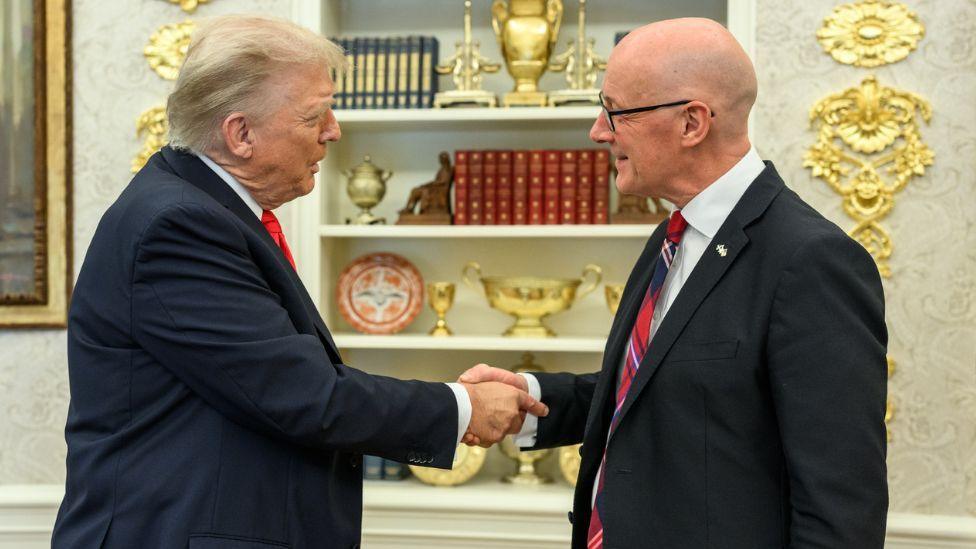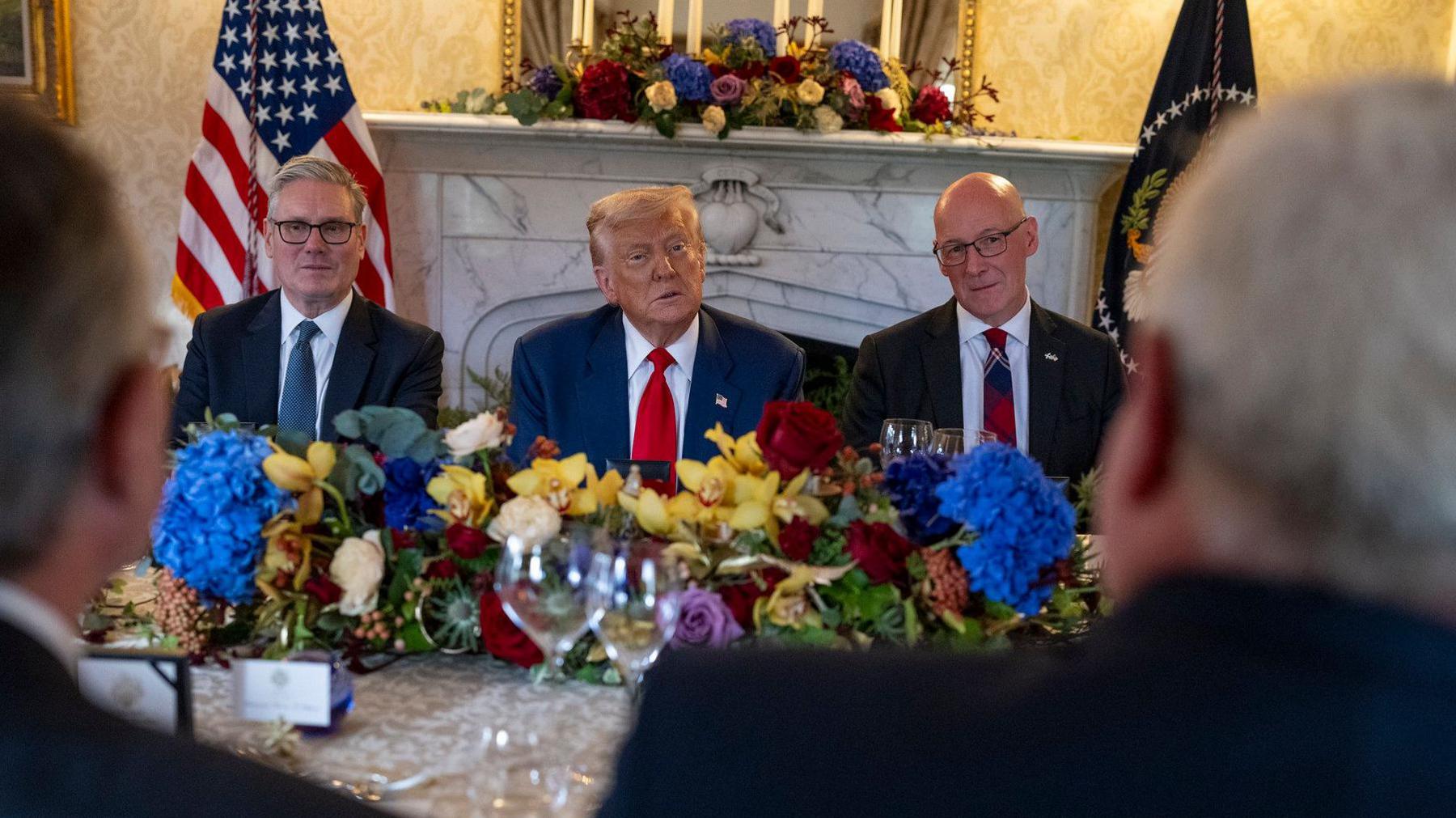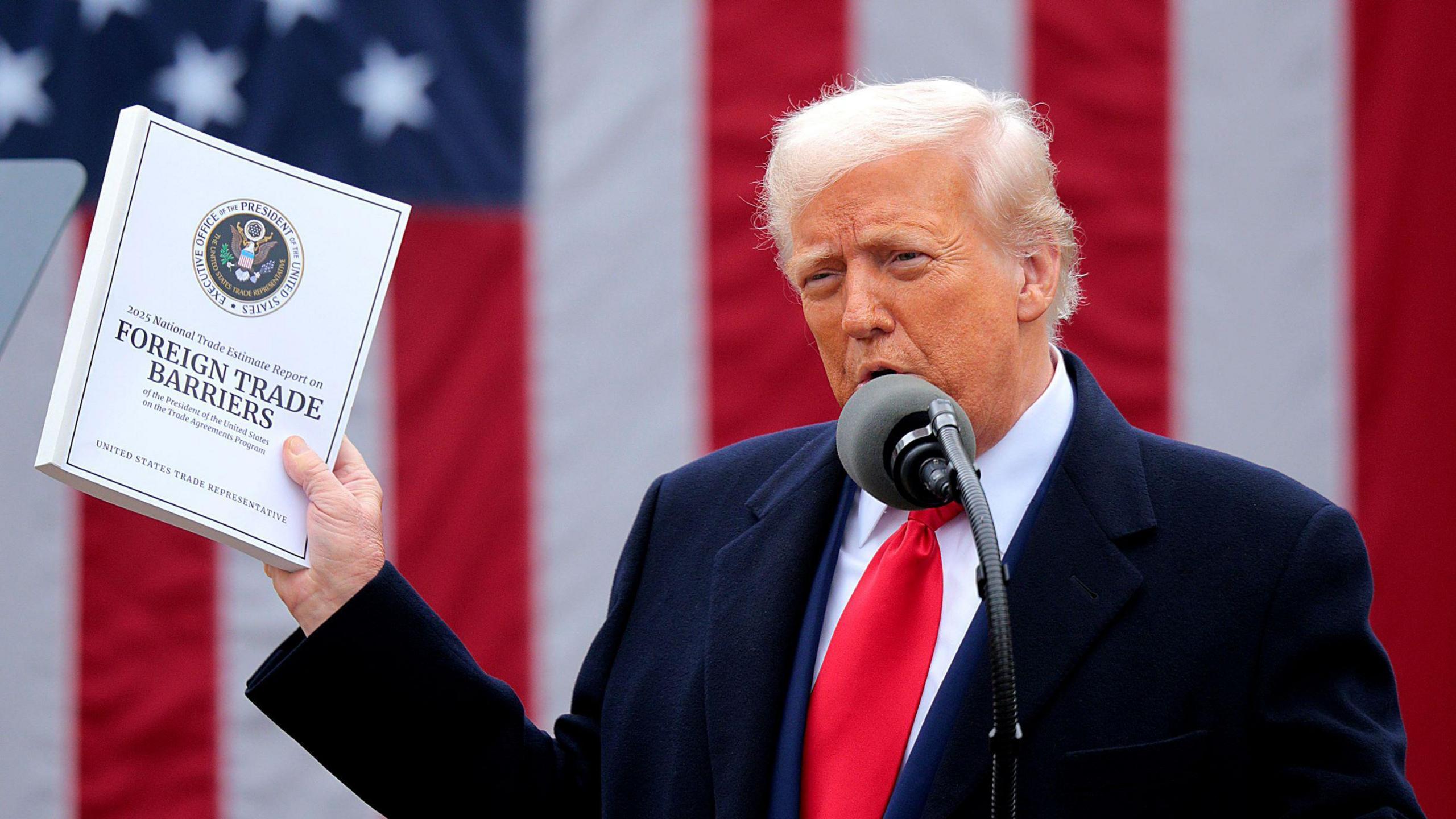'Real chance' of whisky tariff deal with Trump, says Swinney
Swinney outlines visit to White House after talk with Trump
- Published
First Minister John Swinney says there is a "real chance" that a special trade deal for Scotch whisky could be agreed with US President Donald Trump following talks in the White House.
Swinney claimed the UK government had not sufficiently prioritised whisky in trade discussions with Trump, but that he had "sorted" that situation over the summer.
The Scottish government is seeking a reduction or removal of 10% import taxes, known as tariffs, on Scotch entering the US - which the whisky industry says costs businesses £4m per week.
The BBC understands the UK government is seeking whisky tariff reductions as part of wider trade negotiations with the US.
In a statement, a UK government spokesperson said: "There is huge appetite for our whisky in the US and around the world, and our Trade Strategy will help Scottish firms sell even more products in new markets as part of the Plan for Change.
"We continue to work with the US to get this landmark deal implemented as soon as possible."
Swinney met Trump in the Oval Office during a two-day visit to Washington DC this week.
After arriving back in Edinburgh, he said that whisky had not been on Trump's "radar" when he visited Scotland in July.
"I sorted that out over the summer, and it's now got the attention that it needs," Swinney told reporters.
Swinney and Trump have 'constructive discussion' over whisky tariffs
- Published9 September
John Swinney visits US for Scotch whisky talks
- Published9 September
He said: "A better deal for whisky was not previously on the agenda – and it now very much is.
"But the ball is firmly in the UK government's court. They must press on with the detailed negotiations and try to get a deal over the line."
He warned that Trump "believes in tariffs" and that it would not "be easy" to negotiate a deal.
"But I think – and I hope – there is now a real chance of a better deal," the first minister told reporters.
Swinney said that Trump had taken his arguments "very seriously" during a 50-minute meeting.
The first minister argued that relaxing tariffs would be a "win-win" for whisky distillers and US bourbon producers, who sell hundreds of millions of pounds of used barrels to whisky producers each year.

Donald Trump and John Swinney had a 50-minute meeting in the Oval Office
During his whistlestop visit to Washington DC, Swinney met representatives from whisky industries in Scotland and the US before meeting Trump.
The Oval Office talks also covered the conflict in Gaza and Israel's air strikes in Qatar.
The UK's ambassador to the US, Lord Peter Mandelson, accompanied the first minister to the White House. Swinney also stayed at the former Labour minister's residence in Washington DC.
Mandelson has come under media scrutiny for his past friendship with convicted paedophile Jeffrey Epstein.
He told the BBC that he "very much regrets ever having been introduced to Epstein".
Swinney said UK government had been "helpful" during his visit and that there had been "no issues" with the support given by the embassy.
He added that it was up to the prime minister to choose his ambassadors.
Tariff fears
Trump announced a 10% tariff on most UK good earlier this year, as part of his efforts to boost US industries at the expense of international competitors.
The 10% tariff is a base rate, and lower than the 15% tax on EU imports. However, the Scotch Whisky Association says it is costing the industry £4m a week.
The US is the biggest Scotch export market, with about a fifth of all exports heading stateside, and was worth about £1bn in 2024 according to the SWA.
The industry body has said that the tariffs also damage the US bourbon industry due to a £220m-a-year trade in used casks.
The bourbon barrels are sent to Scottish distilleries, where they are used to store maturing whisky.

John Swinney and Sir Keir Starmer held talks with Donald Trump when he visited Scotland in July
When Trump visited Scotland in the summer he said he did not realise whisky was an issue but agreed to discuss it.
Swinney said he raised the issue during talks with the president at his Aberdeenshire golf course in July.
Prime Minister Sir Keir Starmer, who also held talks with Trump in Scotland, is hoping to negotiate further concessions on the tariffs.
The effectiveness of Swinney's and Starmer's efforts is expected to become clearer when Trump makes a state visit to the UK next week.
There is also a looming threat of further trade tariffs on single malt whisky, which was subject to a 25% rate during Trump's first presidency.
A deal struck to suspend that tax during Joe Biden's time in office is due to expire next summer.
The SWA has called for the UK and US governments to agree a permanent settlement to ensure the higher rate is not reimposed, potentially on top of the current 10% tariff.

Although President Donald Trump isn't a drinker of alcohol, Scotch whisky is taking on a special status in his trade policy.
The US president has been lobbied while vacationing in Scotland, and lobbied by the first minister in the Oval Office. He'll probably be lobbied again while on his state visit to the UK.
Thousands of other manufacturing sectors around the world would give a lot to have that level of access to the US president, seeking to carve out exceptions to his tariffs.
They face loss of jobs, earnings and profit due to the imposition of the tax on goods as they arrive in the US.
By comparison, the £4m per week hit to Scotch whisky exports in its biggest market (measured by value, not volume) is small. The UK faces the minimum level of tariff imposed by the Trump administration, at 10%.
Whisky distillers are profitable: they can absorb some of that tax to limit the harm to their market share.
They're selling a luxury product where prosperous Americans drinkers may be willing to absorb higher prices. They can shift marketing efforts to more than a hundred other markets around the world.
And while car makers, for instance, have to cut production and jobs because it has become harder to sell into the US market, whisky distillers can continue making a product that will not be on the market until after Trump has left office.
They face other pressures that are probably more disruptive, as worldwide demand has come down sharply from the post-pandemic surge, consumer tastes shift, and super-premium bottlings have lost their super-premium pricing.
But with access to the Oval Office and the ear of the US president, this may be an opportunity to persuade Trump that Scotch is just one example of an imported product that cannot be replaced by US producers, that depends on importing product (casks) from America, and that penalises American consumers more than foreigners.
Related topics
- Published3 April
